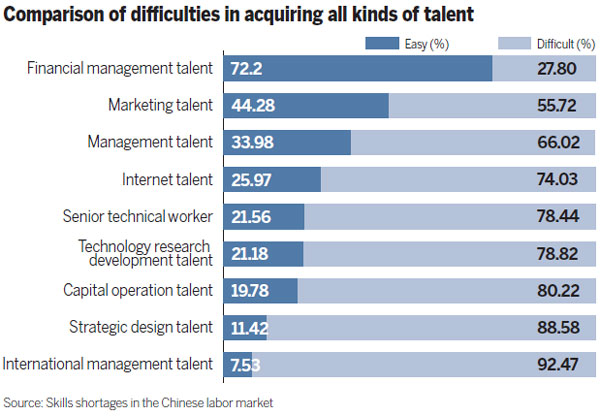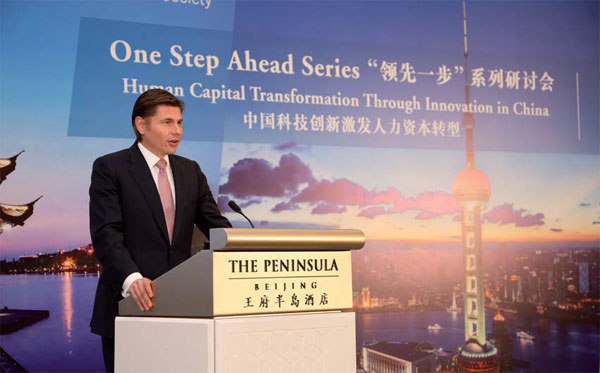Skill gap poses new challenge to economy
Updated: 2016-11-11 07:38
By Chen Yingqun(China Daily Europe)
|
|||||||||
Converting a large number of low-skilled workers to high-value-added talent presents major challenge
Macroeconomic transformation and structural change have resulted in increased mismatches of skills in the Chinese labor market, says a J.P. Morgan commissioned report.
The report says the supply-demand gap for high-skill labor is widening, and highly skilled workers are rewarded far more, as China is transitioning up the value chain from the "world's factory" for low-end products to a "manufacturing power" for high-end technology and services.
Skilled workers account for only about 19 percent of the entire workforce, with highly skilled workers constituting only 5 percent. Although the demand for low-skilled labor is substantial, because of the abundant supply, there is almost no demand-supply gap in that group. While wages in general have risen steadily, incomes of high-skill workers have grown much faster than average.
|
Nicolas Aguzin, chairman and CEO of J.P. Morgan Asia Pacific, says innovation, technology and consumption are now becoming significant drivers to China's economy. Provided to China Daily |

Ronnie Chan, co-chair of the Asia Society, says that while China's economy is experiencing a transformation, its human resources are painfully transforming as well.
"China is evolving into a knowledge-based economy, and the crux of China's present human capital challenge is the need to transform a large unskilled labor force into a talented high-value one, in a practical way," he says.
Nicolas Aguzin, chairman and CEO of J.P. Morgan Asia Pacific, says that instead of relying on traditional industries and infrastructure investment to propel China development forward, innovation, technology and consumption are now becoming significant drivers.
"While in the long term this is a very positive development, in the short term it's creating new challenges, one of which is the lack of skilled, sophisticated workers capable of successfully fulfilling the requirements of companies in these sectors," he says.
The report says that regional demand for skilled workers in the manufacturing sector, which will continue to be the main pillar of the Chinese economy, is increasingly more agglomerated.
As manufacturing is concentrated in the eastern provinces, the accumulation of a more highly skilled labor pool in the east has attracted high-tech industries to the area, squeezing out medium- and low-skill industries as land and labor costs rise. Looking at the distribution of employment across cities indicates that high-skill industries tend to be concentrated in eastern coastal areas, while there is big shortage in central and western China.
"The skill gap is also that the workers who have the skills have been attracted to a few cities where there is a great density of higher-skilled workers," says Chauncy Lennon, managing director of the Global Philanthropy of J.P. Morgan. "So certain cities are magnets for skilled workers, and other cities are struggling to keep up."
The report also finds that the growth of the service industry will lead to greater demand for professionals. The service sector has been developing rapidly and accounted for more than 50 percent of GDP for the first time in 2015. To increase export earnings in a globalized economy, China must move up the value chain from exporting cut-price goods to developing modern service industries and manufacturing with higher added value.
Service industries dealing with IT, software, accounting, finance, marketing, and customer management are expected to grow and absorb a substantial number of professionals, it says.
As more Chinese companies go global, there is also an acute shortage of workers with international management and strategic planning skills, says Diana Tsui, head of Global Philanthropy for the Asia Pacific region at J.P. Morgan
"Many Chinese companies want to go outside of China, to become more internationalized, and management skills is an area that lacks talent and needs to be strengthened," she says.
She says that the firm's philanthropic efforts on workforce development in the region are focusing on training underserved populations to access quality jobs in two sectors that are in great demand for skilled workers.
"One is the information communication techonology (ICT) sector, because the digital economy, the technology and the skill required for this sector is very obvious, especially for young people, who are very tech-savvy," she says.
Another is the healthcare sector. Because of the increasing average age of the population, demand for caregivers and other professionals is huge, she says.
J.P. Morgan commissioned Fudan University and Tsinghua University to conduct comprehensive research on the demand and supply pressures within the Chinese labor market, identifying the skills gap and offering policy recommendations to narrow the deficit.
J.P. Morgan also launched a five-year $250 million global initiative in 2013 called "New Skills at Work", which leverages resources, expertise and global reach to help inform and accelerate efforts to support demand-driven skills training for adults, Lennon adds.
chenyingqun@chinadaily.com.cn
(China Daily European Weekly 11/11/2016 page26)
Today's Top News
China, UK 'golden era' strengthens
UK business calls for a London-only visa system
First Chinese named as new Interpol chief
Chinese-Hungarian Friendship awards presented
Polls missed support for Trump
Superstars party with Jack Ma before shopping spree
Europe would elect Clinton: Poll
Obama, Trump meet at White House
Hot Topics
Lunar probe , China growth forecasts, Emission rules get tougher, China seen through 'colored lens', International board,
Editor's Picks

|

|

|

|

|

|








